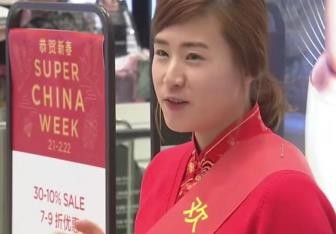E-commerce giants Alibaba Group Holding Ltd. and JD.com Inc. are planning to persuade and get South Korean firms listed on their sites in a bid to keep Chinese tourists from traveling to Seoul to shop, China Daily reported.
The report said that thousands of Chinese tourists take advantage of breaks such as the Oct. 1 National Day and other times of the year to travel to South Korea.
According to China Tourism Academy, the overall numbers of Chinese visitors reached 6.1 million last year, making them the top inbound travelers to South Korea.
According to the report, Alibaba and JD have taken notice of the trend and are both aiming to convince South Korean firms to list products on their sites, to convert the cross-border shopping rush to a stampede of clicks on the computer screen.
In March, JD.com reported that nearly 100 South Korean companies have set up stores on its platform, which resulted in sales leap of more than 10 times by August.
"Brands from South Korea had transactions of over 10 billion yuan ($1.56 billion) on JD.com in 2014. The number is expected to exceed 50 billion yuan in the next three years," the company said.
Zhang Jianfeng, Alibaba's president and in charge of the retail business unit, said that cross-border e-commerce is a priority and products from South Korea play a major role.
"There are a lot of cultural similarities between China and South Korea. With the rising popularity of South Korean soap operas in China, fashionable products, such as clothes and cosmetic, are a great deal in China, especially among young people," Zhang said.
In September, Zhang and his team visited Seoul to attract more fashion-related brands to Alibaba's online shopping platforms and the group's widely used mobile Taobao application.
"No matter if you are well-known brands, or up and coming designer labels, you can reach your target buyers via our online channels," Zhang told South Korean vendors.
Alibaba hosted its first overseas fashion shows in Seoul in September to call the attention of more South Korean brands. It also invited partners Samsung C&T Corp. and Eland, among others, to showcase apparel about to enter the Chinese market.
Samsung C&T already has three flagship stores for its clothes labels Beanpole, Rapido and Mvio on Tmall. The company said they want to make China its "second domestic market" and will debut brand 8 Seconds in China in 2016.
"Offline stores in China contribute the majority of our sales in the country, but we think e-commerce is the way to go in the future," said Smile Kim, who is in charge of Samsung C&T's business in China.
Suk Ji Roh, managing director with the Cosmetic Strategy & Planning Department with South Korea's pharmaceutical, healthcare and cosmetic products company Celltrion Inc., said the plan for sales of a popular foundation primer likely rests on cross-border e-commerce.
"So we are thinking launching our products in Tmall Global and selling to Chinese consumers as imported products. We will then decide our next move with feedback online," she said.



























